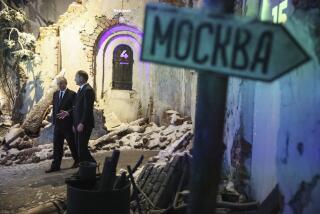Parties Differ Sharply on Safety of Nuclear Plants
- Share via
WASHINGTON — The philosophy and politics of homeland defense got a full airing before a Senate committee Wednesday as Republicans and Democrats offered sharply different views on whether nuclear power plants were vulnerable to terrorist attack and what the government should do about it.
Democrats, citing Al Qaeda documents retrieved from caves in Afghanistan as well as President Bush’s State of the Union speech, said the nation’s 103 nuclear plants were a top target for terrorists and that Americans who lived near them were more worried than ever.
They used the almost 50% failure rate of previous “mock attack” tests at the power plants--conducted, on average, every eight years--and the attacks of Sept. 11 to support their call for beefed-up security exercises and a modernized method for threat assessment.
Republicans, however, insisted that nuclear plants were extremely safe and said the country needed more of them.
“If I were a terrorist, the last place I would try and take over would be a nuclear power plant,” said Sen. George Voinovich (R-Ohio). Led by Sen. Bob Smith of New Hampshire, the Republicans also accused proponents of added plant security of pushing “an anti-nuclear agenda.”
The chairman of the Nuclear Regulatory Commission would not specify what security measures the industry had taken since Sept. 11. But he told Sen. Barbara Boxer (D-Calif.) that his agency was working closely with FBI and CIA “analysts who evaluate threat information, and they are not aware of a credible threat directed at a nuclear power plant.”
He told reporters the government was developing computer models to show how nuclear power plants would fare if, like the World Trade Center and the Pentagon, they were attacked by commercial airplanes.
What was billed as a straightforward hearing on proposed amendments to the Atomic Energy Act, chaired by the Senate’s lone Independent, evolved instead into a high-octane discussion of how much of the nation’s resources to devote to homeland defense and whether private industry or government should direct security programs.
“There are limited assets to spend on security efforts, and we need to allocate those in a careful way,” said NRC Chairman Richard A. Meserve.
“We have to deal with the fact that none of our civilian infrastructure was built to withstand an air attack,” he added later. “We have to make a decision as a country about what level of risk we’re willing to accept.”
Sen. Hillary Rodham Clinton (D-N.Y.) said such decisions should not be made before the nuclear power industry had completed a vulnerability assessment.
“I don’t believe we should be limiting ourselves before we figure out what our needs are,” Clinton said. The government and industry officials must work together to determine how to make the country safe from terrorists and how much that will cost, she said, adding, “then it’s up to Congress and the American public to decide whether they want to bear that cost.”
The spirited back and forth recalled the congressional debate over whether to make airport security screeners federal employees and may have been a preview of a broader national discussion over the Bush administration’s developing plan for national security.
Tom Ridge, director of the Office of Homeland Security, is scheduled to present a strategic security blueprint to President Bush on July 1.
A terrorist attack on a nuclear power plant “is a terrible thing to contemplate but we have to,” Clinton said, adding that 20 million people live near New York’s Indian Point plant.
The hearing revealed sharp differences over what level of preparation is needed to defend against terrorist attack. Responding to a question from Environment and Public Works Committee Chairman James M. Jeffords (I-Vt.) about weaknesses in plant security, Meserve said, “It’s very doubtful that an attacking force would have that level of knowledge.”
The nuclear power industry and the NRC, its federal regulator, support a bill sponsored by Republican Sens. Smith and James M. Inhofe of Oklahoma that would empower guards at all nuclear power plants to carry guns.
Currently, guards in some states cannot carry weapons or fire their guns unless life is endangered.
More to Read
Get the L.A. Times Politics newsletter
Deeply reported insights into legislation, politics and policy from Sacramento, Washington and beyond. In your inbox twice per week.
You may occasionally receive promotional content from the Los Angeles Times.










